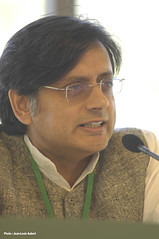
- Image by Getty Images via Daylife
The revelations are so stunning, it sort of changes the landscape of the IPL entirely. For example, Shilpa Shetty as it turns out is merely the 'face' of the Rajasthan Royals (RR) team. She's neither the owner nor a stakeholder in the team, something she has been claiming all along. The IPL committee now is giving the excuse that proper papers havent been sorted regarding the stakeholders of RR. What the heck? You have a huge tournament like the IPL and you dont have papers in order? Is this even believable? Turns out that the real stakeholder is the RR team is Lalit Modi's brother-in-law (whatever his name is).
And of course, the television rights scandal, which is so complex that it took me a minute to understand what reports in the newspapers meant. BCCI now is trying to paint a picture where Lalit Modi is the lead offender and BCCI is the spectator. However are things really that simple? What was the BCCI doing when Lalit Modi so categorically made dodgy deals and biased auctions? To wash their hands now of the scam is really crappy clarification. Instead of Lalit Modi, its the BCCI which should come clear on the matter.
And finally, how can a tournament survive when its sole purpose is profit? There's no sense of pride (most of the domestic players are not in their home teams), no sense of humility and no sense of honour anywhere in the IPL. Its all about money, money and money. In the process of making money if the team wins, well then it can only mean one thing, more money, more money and more money!
Spare us this brazen display of might and financial prowess. We the fans of the great game deserve better. Much better.



